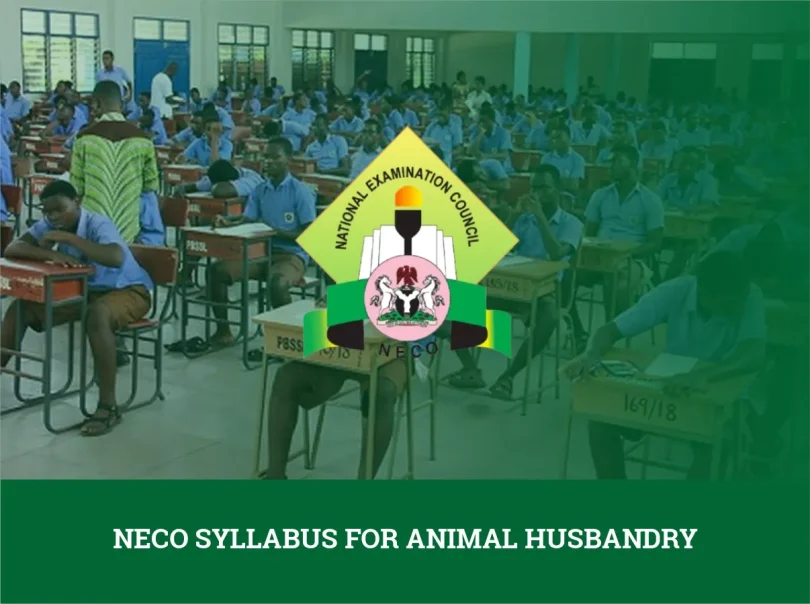Are you preparing for the 2026 NECO Animal Husbandry exam? If so, this article will guide you through, showing the important topics in the NECO syllabus for Animal Husbandry that you need to study to prepare effectively for the exams. Animal Husbandry is the science and practice of breeding, feeding, and caring for animals for food, work, and commercial purposes. It is a key subject for students in the Agricultural Science or science-related track, especially those planning careers in veterinary medicine, agriculture, or animal production.
In NECO, Animal Husbandry is a life skill. If you can understand the care of animals, you are not only preparing for an exam, but you are preparing to work, feed others, and maybe even run your farm one day. Follow the information provided in this article to learn the full syllabus, how the exam is structured, key topics to focus on, and tips to pass the subject with ease.
Objectives of the Syllabus
The NECO exam is a major secondary school examination across Nigeria, organized by the National Examinations Council (NECO). NECO is designed to test students’ knowledge and understanding of the subjects they have studied throughout their secondary school years. The syllabus aims to achieve the following:
- Equip students with practical and theoretical knowledge of livestock and animal care.
- Develop skills in animal breeding, feeding, housing, and health.
- Encourage interest in animal-based agriculture for food and income.
- Prepare students for higher education or vocational training in animal production.
NECO Animal Husbandry Exam Structure 2026
The exam is divided into three compulsory papers: Paper 1, Paper 2, and Paper 3.
| Paper | Description | Questions | Time | Marks |
|---|---|---|---|---|
| Paper 1 | Multiple-choice questions | 40 questions | 40 minutes | 40 marks |
| Paper 2 | Essay questions from all topics | Answer 4 out of 6 | 2 hours | 80 marks |
| Paper 3 | Practical-based questions | 4 questions | 1 hour 30 minutes | 60 marks |
Note: For school candidates, Paper 3 is a real-life practical exam. For private candidates, it is a test based on practical knowledge.
NECO Syllabus for Animal Husbandry
Here are the key topics and areas covered in the syllabus you need to focus on while studying:
A. LIVESTOCK PRODUCTION
Importance of Farm Animals
Farm animals are useful for:
- Food (meat, milk, eggs)
- Raw materials (leather, wool)
- Manure for crops
- Work animals (e.g., donkeys)
- Jobs and income
- Pets, sports, and cultural festivals
Classification of Farm Animals
- Monogastric animals (like pigs and poultry) have one stomach.
- Polygastric or ruminant animals (like cattle and goats) have multiple stomachs.
Internal Organs and Their Functions
Know the organs like:
- Liver, lungs, heart, kidneys, stomach, intestines: Understand what each does in the animal’s body.
Body Systems in Animals
Understand how systems work:
- Digestive
- Respiratory
- Circulatory
- Nervous
- Reproductive
- Skeletal
Reproduction in Farm Animals
- Ovulation and mating
- Gestation and delivery (parturition)
- Lactation and hormones
- Egg formation in poultry
- Signs of pregnancy and the heat period
B. ANIMAL NUTRITION
Meaning and Classes of Animal Feed
Animals need six main nutrients:
- Carbohydrates
- Proteins
- Fats
- Vitamins
- Minerals
- Water
Feeds and Feeding
- Types of feed rations: maintenance, growth, production
- Preventing malnutrition
- Formulating feed using local ingredients
Processing and Marketing Animal Products
- Slaughtering methods
- Processing and packaging: meat, milk, eggs, honey, wool
- How to sell and distribute animal products
C. PASTURE AND BREEDING MANAGEMENT
Animal Selection and Breeding
- Breeding methods: inbreeding, crossbreeding, line breeding
- Pros and cons of each method
Artificial Insemination (AI)
- What it means and how it’s done
- Tools used
- Steps and precautions
- Advantages over natural mating
D. ANIMAL HEALTH
Common Diseases in Farm Animals
- Types of diseases: bacterial, viral, fungal, nutritional
- Signs and symptoms
- How to prevent and treat them
Parasites and Pests
- External parasites: ticks, lice
- Internal parasites: worms
- Life cycles and effects on animals
- Control methods, including local (ethnoveterinary) practices
Tips to Study and Pass the NECO Animal Husbandry Exam
Here are practical tips to help you pass the exam with ease:
- Prepare for multiple-choice, theory, and practical sections. Don’t skip any area.
- Practice and label organs, systems, and animal parts. Use your textbook or past questions.
- Think about local farms, animals you have seen, or farming practices in your area.
- You need to know what each term, system, disease, or process means.
- NECO often repeats common topics like reproduction, animal diseases, and feeding. Ensure you study and review past questions.
Animal Husbandry is a practical subject as it includes hands-on knowledge, like identifying organs, tools, breeds, and diseases. It teaches you how to care for animals, a growing skill in any country’s agricultural economy, and to pass the exam, ensure to study labeled diagrams, practice identifying tools, and learn how to carry out basic animal care tasks.
Following the guide and studying with the syllabus, ensure that the past questions are your study checklist. Bookmark this page and keep visiting for updates on the NECO Syllabus for Animal Husbandry and other related topics!







Leave a Comment